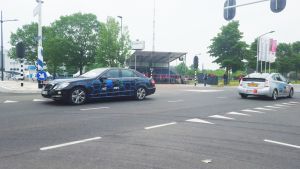Cars that interact to coordinate their routes while driving and move autonomously might help prevent accidents and traffic jams, as well as reduce fuel consumption. On the occasion of the Grand Cooperative Driving Challenge (GCDC) which took place in Helmond, Netherlands, 10 European research teams now showed how cars can communicate successfully on the road. The joint AnnieWAY team of “FZI Research Center for Information Technology and Karlsruhe Institute of Technology (KIT) came in second in this competition.
The driving skills tests in the competition required the vehicles to merge alternately with another line of vehicles, communicate and coordinate their actions when passing an intersection, and form a rescue lane for emergency vehicles at the roadside. The vehicles drove simultaneously in a group and coordinated their maneuvers cooperatively, using radio-based Vehicle2Vehicle communication. In addition, a jury of experts rated the concept of the respective human-machine interfaces.
The AnnieWAY team easily mastered the driving disciplines and got a positive rating by the jury. The concept of the human-machine interface designed by the Karlsruhe scientists is centered on sensor and system data visualization. Here, the Swedish team of Halmstad University succeeded in convincing the jury with the user-friendliness of its system, which gained them the necessary points to win the overall competition. The Swedish KTH Truck team came third.
Thus, the AnnieWAY team just failed to defend their victory from the first GCDC competition in 2011. As early as in 2007, the AnnieWAY team successfully participated in the American DARPA Urban Challenge 2007 and made it into the finals. “The GCDC was an intense and exciting event. During this week, we learned a lot and could see that we are on the right track in many aspects,” Ömer Sahin Tas, Research Assistant at FZI, said. Already in mid-May, the participating teams started to prepare for the competition on special streets in Helmond that were closed for public traffic at the time. During this intense week of preparations, the Karlsruhe scientists not only worked on the fine-tuning of technology, but also tested the communication and interaction of their research vehicle BerthaOne, a converted Mercedes E Class, with the vehicles of the other nine teams. “For us, it was a unique occasion to test our system against so many different technical platforms and we obtained important input for our future research,” Claudio Bandera, Research Assistant at the FZI, said enthusiastically.
In the beginning of 2015, the FZI and KIT scientists started preparing their research vehicle BerthaOne for the challenges posed by this competition. For this purpose, they conceived a new software structure for BerthaOne that is based on the Robot Operating System, thus creating a versatile platform for autonomous driving that serves as the basis for the cooperative algorithms. Being an experimental vehicle in FZI Living Lab Automotive, BerthaOne is equipped with sensors and technology for video-based localization. When preparing for the competition, the team also used the CoCar research vehicle of the FZI as well as a KIT research vehicle. Both of them were equipped with Vehicle2Vehicle communication. This way, the researchers were able to test the communication between vehicles extensively in advance.
The Grand Cooperative Driving Challenge 2016 took place for the second time on the A270 between Helmond and Eindhoven in the Netherlands. The competition focusing on innovative, autonomous driving features was organized in conjunction with the Dutch Technology Week and the i-GAME project. In this project, funded by the European Commission, research organizations, universities, car manufacturers, and suppliers are working on solutions that will make autonomous driving in everyday traffic a reality soon.
Other KIT and FZI projects on autonomous driving:
https://www.fzi.de/forschung/projekt-details/autoples/
Press information on AnnieWay’s winning entry to the GCDC in 2011 (in German only): https://www.pkm.kit.edu/kit_kompakt_3121.php
About FZI Research Center for Information Technology
The FZI Research Center for Information Technology at Karlsruhe Institute of Technology is a non-profit institution for applied IT research and technology transfer. It brings the latest scientific IT findings to companies and public institutions, and trains young people for academic and economic careers or for self-employment. Led by professors from various faculties, the research groups at FZI develop concepts, software, hardware, and system solutions across all disciplines, and implement prototypes of these solutions. The FZI House of Living Labs provides a unique research environment for application research. All FZI research divisions have been certified according to DIN EN ISO 9001:2008. Its main office is in Karlsruhe. A branch office of FZI is located in Berlin.
More about the KIT Mobility Systems Center: http://www.mobilitaetssysteme.kit.edu
Being “The University in the Helmholtz Association”, KIT creates and imparts knowledge for the society and the environment. It is the objective to make significant contributions to the global challenges in the fields of energy, mobility, and information. For this, about 10,000 employees cooperate in a broad range of disciplines in natural sciences, engineering sciences, economics, and the humanities and social sciences. KIT prepares its 22,800 students for responsible tasks in society, industry, and science by offering research-based study programs. Innovation efforts at KIT build a bridge between important scientific findings and their application for the benefit of society, economic prosperity, and the preservation of our natural basis of life. KIT is one of the German universities of excellence.

